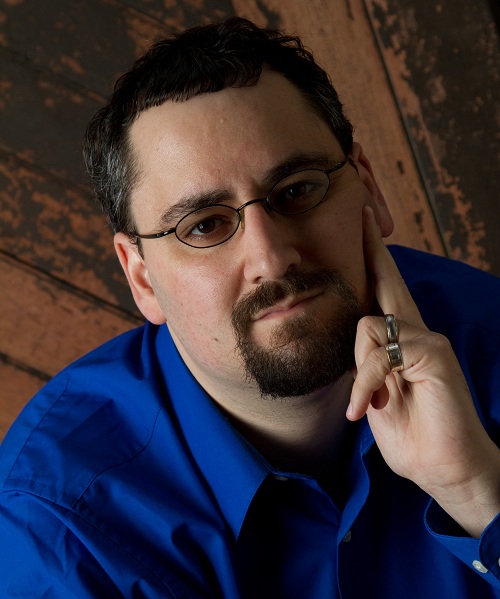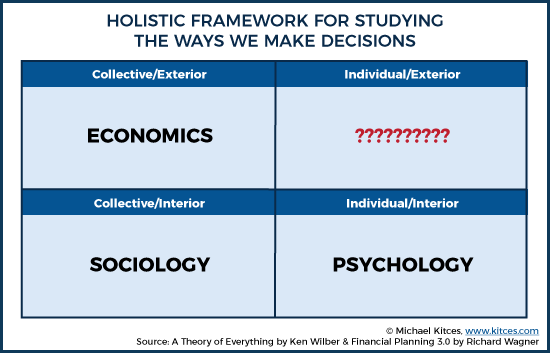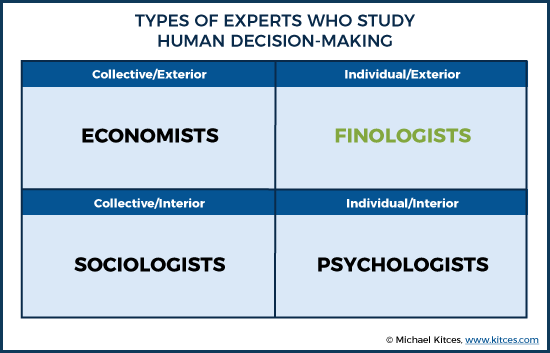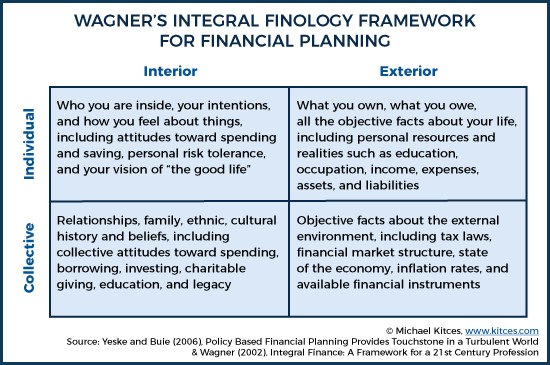Executive Summary
In the modern era, “money” is essential for survival, a means of converting our productive labor into a common unit of exchange that can be used to buy whatever we need. Yet at the same time, money is complex, and the incentives and motivations it stirs exerts powerful forces on us… such that, even though money is necessary for survival, many lack the basic “money competency” skills necessary to harness its power effectively.
Yet despite the essential nature of money, there is remarkably little research and understanding in how we relate to it. While economics studies how humans allocate scarce resources, and psychology studies the human mind and behavior, there is a gap at the intersection between the two – an emerging new body of knowledge, that financial planning pioneer Dick Wagner dubbed “Finology”.
The key to understanding Finology is to recognize that there are both interior and exterior aspects to our relationship with money. On the one hand, we can’t make financial recommendations without understanding what someone owns and owes, and how that fits within the current economic environment and existing tax laws. Yet that information alone isn’t enough, without also understanding someone’s personal goals and desires, their relationships with family and cultural beliefs, and their vision of what it takes to live “the good life”.
Unfortunately, though, the history of financial planning and its existing body of knowledge have focused almost entirely on the “exterior” factors of money and how it works, and relatively little regarding the individual and their relationship with money itself. Yet in a world where our ability to have a healthy relationship with money is increasingly essential to survive and thrive – or else, we succumb to a never-ending series of self-destructive money behaviors – Wagner suggests that financial planning itself is likely to emerge as a bona fide profession in the 21st century… as financial planners themselves become Finologists in the future!
The Modern Age Of Money

Economists define money as something that embodies three core functions: money is a store of value, a medium of exchange, and a unit of accounting. Yet unlike currencies of old (e.g., physical gold coins), modern money itself has virtually no intrinsic value whatsoever; its value derives from an implicit societal agreement that it will function the way it does.
Yet despite money itself having no intrinsic value, it exerts a tremendous force in our lives. It’s the second most addressed topic in the Bible (second only to God!), and is actively discussed amongst the key texts and ancient social codes of all major religions. And arguably, as human society has shifted from its hunter-gatherer and agrarian roots – especially in the “modern” era since World War II – money has taken on an even more central role in our lives than it did in the past.
As a result, Wagner makes the case that “money competency” today is a core survival skill. If we run out of money, we have “survival-level” problems, as we lose access to vital resources like food, shelter, and clothing. In the past, we could rely on family and neighbors to provide support for a wide range of “care” and support, but now it is all being institutionalized, with money at its core. Thus, we debate about how to pay for health care, child care, elder care, education, social work, welfare, etc., in terms of money (and not in terms of the capabilities of our families and villages to provide these various forms of care for those with needs).
[Tweet "Money competency is a 21st-century survival skill… that few are ever formally taught!"]
On the plus side, money is incredibly efficient as a means of ensuring the effective allocation of broader societal resources. Wagner suggested that “money is the most effective mechanism ever created for matching unmet needs with unused energies and mutual benefit.” After all, we as financial advisors couldn’t ourselves have our food, clothing, and shelter, without the money that allows us to specialize in what we do, and exchange the money we receive with others who provide those goods and services that we need. Nor could systems like AirBnB and Uber “work” without money facilitating the matching mechanism of people who have idle capacity or resources and a desire to convert it into money for future use.
Even better, money also makes these kinds of resource allocations possible in a remarkably peaceful manner. As Wagner put it, “money’s best feature is that it empowers human beings to self-organize for mutual benefit without violence or coercion.” After all, for most of our human existence, we lived in a constant state of fear that neighboring tribes or ravaging hordes would come galloping over the hills at any moment to ransack our homes and communities. A key aspect of most early forms of government and leadership was the opportunity to pledge fealty to an overlord, in exchange for that leader maintaining an army and providing protection to his/her people.
Today, however, conquerors go forth to fight for market share and financial capital, not physical territory and land/resource capital. Wagner notes that today’s “fearsome warriors” fight their battles in their offices and boardrooms, not the physical battlefield. With the side benefit that the capitalism at the core of their fighting generates wealth and drives productivity forward, rather than destroying them (as occurred in the physically destructive battles of old). When there is a rule of law and respect for contracts and property rights, money lets us live lives in ways that wouldn’t be conceivable if we didn’t have it (and wasn’t conceivable just a few generations ago). And money rewards innovation… unlike in the past, where innovation just meant you weren’t taking the time to tend your land, and risked starvation.
Yet despite how crucial money is to our ability to function in modern society, philosopher Jacob Needleman once observed “Everybody is weird about money.” Economists assume that money is value-neutral, but in the real world it is very much values-laden for most.
[Tweet "Economists assume that money is values-neutral, but in reality it’s quite values-laden!"]
In fact, money remains one of the most taboo subjects in modern society, discussed in even more hushed tones than previously “inappropriate” subjects for group discussion like religion, sex, and politics (which increasingly dominate social media today!). Yet our discomfort in talking about money is itself a serious problem, given that money skills do not come to us naturally. After all, how can we make intelligent money decisions, if we can’t even talk about it?
Finology And The Study Of Our Relationship With Money
The discipline of economics studies how people make decisions regarding the use of scarce resources, built around the simple presumption that people respond to (external) incentives. When paired together with sociology, which studies how humans organize themselves into structured communities to satisfy their interpersonal needs, we form an understanding of how human beings collectively respond to both external and interpersonal incentives.
However, the reality is that even within the broader context of responding to external incentives and interpersonal relationships, we are still all our own individual human selves. In turn, this led to the rise of the field of psychology, which studies the behavior and mind of the individual, with all of the idiosyncracies that emerge at the individual level, in a manner that can even defy the collective wisdom implied by economics and sociology.
Yet if we think of the ways these various disciplines study the decisions we make as human beings, a gap emerges. Philosopher Ken Wilber once proposed the idea of “Integral Theory”, and that all human knowledge can be placed into a four-quadrant grid. On one dimension is the split between the interior and exterior. On the other, the collective versus the individual.
In this framework, economics and sociology study the internal and external forces that impact how we collectively organize ourselves and respond to collective incentives. Psychology studies the internal forces that impact how we make decisions individually. But what do we call the intersection of the individual and the external (money) forces that apply to that individual?
In his recent book, Wagner posed the question “what goes above psychology” in the grid above? How do we define the study of the individual and his/her relationship with, and decisions regarding, the external forces of money?
Currently, such research lives mostly in the world of exceptions to other domains. Economics has recognized the existence of “behavioral finance”, but mostly in the context of how it violates existing collective economic tenets (but doesn’t necessarily study the mind of the individual). Psychology has spawned the world of “financial counseling” and “money therapy” to attempt to address the issue from the individual perspective, but struggles to understand and characterize the external role that money itself plays in the process (as most psychologists don’t know anything more about money itself than the average individual). Arguably, these gaps exist precisely because the upper right quadrant is not meant to merely be an extension of, or exception to, economics or psychology, but a discipline unto itself.
Wagner proposed that this quadrant be dubbed “Finology”, which he defined as the study of the relationships between human beings and money, and the study of minds, brains, customs, and behaviors with respect to money and money forces. Or more generally, the study of money and (human) value exchange. And notably, its “finance” root unto itself is a word that originated etymologically from marking the settlement (end) of a financial dispute or debt, a resolution which is very specific to the individual, and ultimately recognizes the impact that the financial (debt) obligation has on the individual.
From this perspective, “finology” fills the void – a void created by the fact that we don’t have any word in the English language to describe the relationship between human being and money. And in turn, it implies that our role as financial advisors is not just to weave together economics and psychology, but to become “finologists” – those who study finology, and the unique intersections between human beings and their money, and apply its principles in practice with our clients.
Integral Finance and The Finology Garden Of Knowledge
Notably, a key point in the context of Finology is that the current financial planning body of knowledge – as captured by the CFP Board’s Principal Knowledge Topics – is primarily focused on the exterior aspects of money. In other words, the CFP Board defines “financial planning” as the study of retirement planning, estate planning, tax planning, investment planning, risk management and insurance planning, etc., all of which are focused around how to plan for and with various money resources. But none of those topic categories deal with our relationship to money, why it is so taboo that we’re afraid to talk about it, and why people often make major financial decisions for reasons that are influenced by, but not necessarily beneficial for, their money and finances.
In point of fact, though, Wagner himself proposed a more holistic approach, again using Wilber’s Integral Theory, applied to financial planning in a manner that Wagner dubbed “Integral Finance” (or what might now be called “Integral Finology”). In this context, a holistic finologist would examine both the interior and exterior, individual and collective, aspects of a client’s circumstances, in order to craft a recommended path forward for clients.
In this regard, it becomes clear that the bulk of what we as (certified) financial planners currently study and talk about with clients is focused on the “exterior” (the right), with less on the “interior” (to the left). While we sometimes capture pieces of the interior – from personal risk tolerance and attitudes towards saving and spending, to family dynamics and charitable inclinations – thus far it is not something we are collectively trained in, nor something we deliver systematically to clients.
These interior and more “personal” questions about our views and relationship with money have thus far been the domain of a smaller subset of financial planners, often dubbed the practice of “life planning”. Although many – including Wagner himself – would contend that the inclusion of the interior is not a “life planning” alternative to financial planning, but simply “financial planning done right”. Or at least, “finology done right”, holistically integrating all the quadrants.
Finologists And The Future Of The Financial Planning Profession
As Wagner viewed it, the financial planning profession’s mission and purpose is to work with people and their relationships with money and the fearsome forces that money generates within our lives and cultures.
In this context, it is likely no coincidence that financial planning has just begun to emerge as a profession in the past 50 years. Because it’s only in the era since World War II that we began our shift into the “Age of Money”, a world where money is dissociated from the underlying physical constraints of hard currency, and with the help of Smith’s “invisible hand” is increasingly efficient of helping human beings allocate resources… even as they are buffeted by its money forces.
In fact, Wagner believed that financial planning would emerge as the newest authentic profession of the 21st century, on par with the recognized professions of law, medicine, and theology… where finologists “serve as 21st century pastors of a secular faith helping people address the great mysteries” of how to use money (rather than letting money use them). A role that today’s financial planners may inevitably be forced into anyway, as the rise of technology and automation decreases the relevance of financial services products and brings “finology decisions” to the fore in the client relationship.
Of course, part of the challenge to this transition is that, as noted earlier, the CFP body of knowledge that financial planners are taught (along with the financial planning software we use) is still built primarily around the products we’ve sold over the decades. Thus why the CFP curriculum includes extensive teachings around life insurance (which we sell) but not automobile or homeowner’s insurance (which most CFPs don’t sell), in-depth knowledge about investments (which we sell) but not liabilities (as most financial planners aren’t paid for mortgages or credit cards), and includes whole courses about how to save for college (since we’re paid for 529 plans) and plan for the estates (which often necessitates more life insurance) for our children, but not how to teach and instill good money values in the children we’re raising to ensure the money doesn’t spoil them.
In addition, the CFP body of knowledge does not include much in the interior dynamics of finology at all, or what are often called the “soft” skills or the “art” of financial planning. Though Wagner would have suggested that “art” versus “science”, or “soft” versus “hard” skills, is the wrong way to think about the issue; with Integral Finology, the distinction is merely one of “interior” vs “exterior” domains, both of which are important. Though thanks to the recent rise of “Financial Counseling Labs”, the interior is now increasingly being subjected to scientific scrutiny (just as the exterior has in the past).
Ultimately, the evolution of financial planning beyond the “founding” CFP body of knowledge even raises the question of whether the profession of the future really is “financial planning”, or if the evolution of the profession (and the formalization of its expanded body of knowledge) will lead to the rise of “finology” as a new common term, and “finologist” as the label for those who practice its teachings (and also distinct from those who simply sell financial services products).

And in the meantime, for those who want further perspective on how and why financial planning and finology are likely to become increasingly elevated and essential in the future, I highly encourage you to check out Dick Wagner’s “Financial Planning 3.0”!
So what do you think? Is it fair to characterize money as a “secular force” in our lives? Is Finology a distinct discipline beyond financial planning? Will all financial advisors eventually become “finologists” in the future? Please share your thoughts in the comments below!








The biggest surprise to this left-brained engineer when I started in the industry was the amount of irrational money behaviors. I assumed that, when shown a better strategy, people would logically agree. I quickly learned that there is MUCH more “art” in financial planning than most people realize!
Sometimes, motivating someone to pursue their own self-interest is more challenging (and rewarding) than designing the strategy to accomplish their goals.
I think it’s critical for the CFP Board and other teaching platforms to include the “soft” skills in their training, especially as more people without sales backgrounds fill the ranks.
-Elliott Weir, III Financial
Healthy, Wealthy and Wise
Ben Franklin’s
payoff for a certain good behavior (early to bed and early to rise) is
that a man would be “health, wealthy and wise.”
For assistance in achieving those ends, we’ve developed 3 principal professions:
1. Medicine to keep you healthy,
2. Financial Planning to keep you wealthy, and
3. Law and Theology to keep you wise. The law tells you what you must do
(and not do) and theology tells you what you should do. Or to put it
another way, the law gives you the rules of the game, and theology (or
philosophy, if you are not a believer), examines why you are playing the
game in the first place.
Absolutely love this! 🙂
Thanks for sharing!
– Michael
This article challenges the profession to move from one that is merely selling products to one that addresses people’s behavior with money. People would have much more money to put toward retirement, college savings and creating wealth if there was more assistance to help them understand their relationship with money. Neither the secular or religious sectors have been effective in this area (with a handful of exceptions). You may have uncovered a new industry full of opportunity. There are a lot of people in our culture under financial stress because of their relationship with money and all the shiny things it can buy.
Actually, I think you may find theology (Judeo-Christian) spawned philosophy, law, medicine and financial planning…check Proverbs. It may be argued theology is birthing finology too, as people face the last third of their life where money is driving their living and legacy values. An example is the billionaires club trying to figure how to spend their excess to make the world better. I do like the Ben Franklin piece…it resonates for non-believers.
I would have that you’d put Anthropology in the top right. Anthropological research into the role of money, credit, and debt on relationships and culture is extensive. Two reviews of the literature:
http://www.annualreviews.org/doi/full/10.1146/annurev-anthro-090109-133856
http://www.academia.edu/6681094/The_Anthropology_of_Credit_and_Debt
Though probably not your target demographic, I’d also recommend this recent book as an interesting and accessible look into the financial lives of modern Americans.
https://www.amazon.com/Financial-Diaries-American-Families-Uncertainty/dp/0691172986
There are many people interested in how individuals navigate the powerful forces that money exerts in their lives, although they’re not necessarily financial planners!